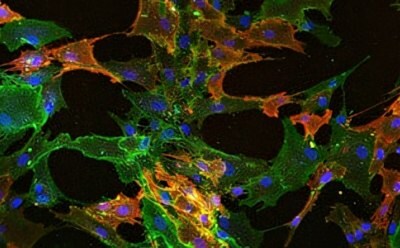Stem Cell Culture

Stem cells have the unique ability to self-renew or differentiate into various cell types in response to appropriate signals. These properties provide stem cells with unique capabilities for tissue repair, replacement and regeneration, making them valuable research tools in regenerative medicine and stem cell therapies.
Related Technical Articles
- FAQs and information about IPS Cells or induced pluripotent stem cells (iPSCs). Including what are IPS cells, learning stem cell basics, reprogramming methods, and iPS cell culture techniques.
- Mouse embryonic fibroblasts (MEFs) serve as a feeder layer for both mouse and human embryonic stem cells (ES cells) and induced pluripotent stem cells (iPSCs).
- We offer a large collection of cell culture media, supplements, bioactive small molecules, and growth factors used to control the cell fate of human iPSCs.
- Read types of stem cells including multipotent stem cells, Pluripotent stem cells and iPSCs and their applications in basic stem cell research, stem cell therapy and disease modelling
- This white paper illustrates the importance of three-dimensional (3D) cell culture in the production of pluripotent stem cell (PSC)-derived models of embryo development and differentiation. It contains a general overview of embryoid bodies (EBs) and a comparison between the various methods used for their generation.
- See All (27)
Related Protocols
- Information about mesenchyme, specifically mesenchymal stem cell procotols. Step-by-step cell culture protocols for mesenchymal stem cell (MSC) isolation, expansion and differentiation.
- Step-by-step stem cell culture protocols for human induced pluripotent stem cells (iPSCs) including ips cell thawing, expanding, freezing and characterizing.
- Step-by-step culture protocols for neural stem cell culture including NSC isolation, expansion, differentiation and characterization.
- Stem Cell protocols for cryopreservation, thawing of cryopreserved stem cells and media preparation.
- Step-by-step hematopoietic stem cell culture protocols for isolation, expansion and differentiation of CD34+ hematopoietic progenitor cells including CFU assays. It can be cultured under defined conditions designed either to promote self-renewal and increase the number of primitive cells.
- See All (10)
Find More Articles and Protocols

Multipotent stem cells include adult stem cells that can self-renew or to differentiate into specialized, tissue-specific cell types. Examples include hematopoietic stem cells (HSCs) that differentiate into various blood cells; mesenchymal stem cells (MSCs) that differentiate into osteoblasts, myocytes, chondrocytes and adipocytes; and neural stem cells (NSCs) that differentiate into neurons, astrocytes and oligodendrocytes.
Pluripotent stem cells can differentiate into any cell lineage. They are classified based on the tissue of origin into embryonic stem cells (ESCs), perinatal stem cells, and induced pluripotent stem cells (iPSCs). ESCs are derived from embryos and can divide indefinitely in an in vivo stem cell culture. Perinatal stem cells are derived from umbilical or placental blood or tissue, and are the most widely used pluripotent stem cells. Cord blood banking at birth is increasingly accepted as an option for treating complicated disorders later in life. The iPSCs are adult cells that are reprogrammed, or induced to behave like ESCs. The significant advantage of using iPSCs for medical applications is the reduced chance of graft rejection, since the cells are derived from the patient’s own tissues.
Stem Cell Research Applications
Stem cells occupy an active and growing area of basic science and clinical research due to their ability to self-renew and differentiate into mature cell types. Current clinical applications for stem cells include treatments for neurological and cardiovascular diseases, autoimmune disorders, cancer, wound healing, and disease modeling and drug screening. Newly discovered gene editing technologies like CRISPR may advance stem cell research and offer enormous promise in treating difficult disorders.
Stem Cell Culture Basics
Stem cells require specialized, high-quality media and expert culture techniques for propagation in the laboratory. Suboptimal stem cell culture conditions can easily lead to unwanted stem cell differentiation or to cellular senescence. Stem cell differentiation is triggered by various factors in vivo, some of which can be replicated in in vitro stem cell cultures. Some stem cell lines are immortal and can be cultured indefinitely, so it is imperative to select the right stem cell type for your research application.
Recent advances in the stem cell field have been due to the advent of CRISPR genome editing technology and 3D cell culture techniques. Advanced protocols such as those that generate organoids from iPSCs have provided scientists with more predictive in vitro “disease-in-a-dish” models.
To continue reading please sign in or create an account.
Don't Have An Account?